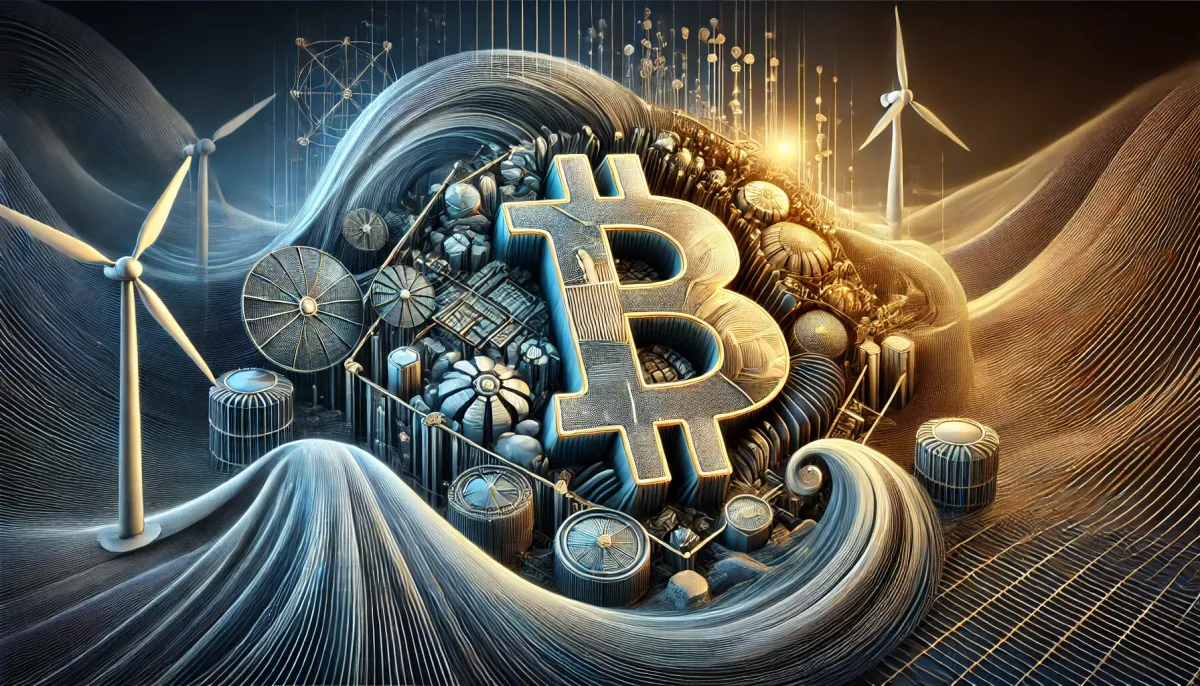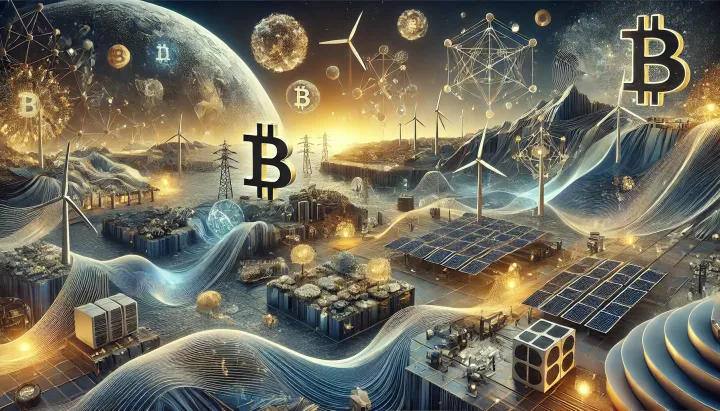Monetizing Renewable Surplus: Bitcoin's Role
The June 20, 2024 episode of The Bitcoin Layer featuring Fred Thiel explores innovative approaches to monetize stranded renewable energy through advanced Bitcoin mining technologies, including two-phase immersion cooling and decentralized energy systems.

- My 'briefing notes' summarize the content of podcast episodes; they do not reflect my own views.
- They contain (1) a summary of podcast content, (2) potential information gaps, and (3) some speculative views on wider implications.
- Pay attention to broadcast dates (I often summarize older episodes)
- Some episodes I summarize may be sponsored: don't trust, verify, if the information you are looking for is to be used for decision-making.
Summary
The June 20, 2024 episode of The Bitcoin Layer featuring Fred Thiel explores innovative approaches to monetize stranded renewable energy through advanced Bitcoin mining technologies, including two-phase immersion cooling and decentralized energy systems. It emphasizes government partnerships, AI compute integration, and grid balancing to optimize energy use and drive sustainable practices. The broadcast highlights critical policy and infrastructural challenges that must be addressed to unlock both economic and environmental benefits.
Take-Home Messages
- Monetizing Stranded Energy: Underutilized renewable resources are transformed into profitable Bitcoin mining operations.
- Innovative Cooling: Two-phase immersion cooling technology boosts mining efficiency and reduces costs.
- Decentralized Energy: Localized energy generation alleviates transmission challenges and stabilizes grids.
- Integrated Compute: Combining Bitcoin mining with AI workloads maximizes energy utilization.
- Policy Reforms: Regulatory and land use changes are critical for scaling energy harvesting initiatives.
Overview
Marathon CEO Fred Thiel explains how stranded renewable energy assets, such as geothermal, hydro, and solar power, are being monetized through Bitcoin mining. He details government partnerships—most notably in Kenya—and the economic potential of converting wasted energy into revenue. The discussion grounds its insights in real-world energy challenges and opportunities.
Thiel highlights the role of advanced technologies like two-phase immersion cooling in enhancing mining efficiency. This innovation not only reduces operational costs but also enables the integration of Bitcoin mining with AI compute operations. The technology serves as a cornerstone for optimizing energy use in digital asset compute.
The broadcast examines grid limitations, including transmission constraints and balancing issues. Thiel advocates for decentralized energy generation as a solution to these challenges. He also stresses that policy reforms and innovative land use strategies are essential to support these initiatives.
Global perspectives are presented through examples from Finland’s district heating projects and potential opportunities in Latin America, Africa, and Asia. The discussion underscores that integrating energy harvesting with digital asset compute can spur sustainable economic and environmental benefits. Overall, the conversation positions Bitcoin mining as a catalyst for broader energy transformation.
Stakeholder Perspectives
- Government policymakers view these initiatives as a means to unlock revenue from untapped energy, while remaining cautious about regulatory reforms.
- Utility companies are concerned with grid stability and the challenges of integrating decentralized energy systems.
- Bitcoin mining firms see opportunities to lower costs and diversify revenue through innovative energy solutions.
- Technology providers focus on leveraging advanced cooling and energy management to optimize digital asset compute.
- Environmental advocates support the efficient use of renewable surplus but monitor potential local ecological impacts.
Implications and Future Outlook
Innovative Bitcoin mining practices that monetize stranded energy can drive significant changes in energy policy and grid management. By adopting decentralized energy generation, stakeholders can reduce reliance on centralized transmission systems and enhance overall grid resilience. This shift may prompt governments to reexamine existing regulatory frameworks and invest in local energy solutions.
Technological advancements such as two-phase immersion cooling and integrated AI compute models are set to redefine operational standards in energy-intensive industries. These innovations promise to improve efficiency and open new revenue channels while minimizing waste. The convergence of computing and energy sectors signals a broader trend towards sustainable digital infrastructures.
In the long term, the scalable adoption of decentralized energy models for Bitcoin mining could transform global energy markets. This approach supports both economic growth and environmental sustainability by leveraging underutilized renewable resources. Stakeholders across policy, industry, and technology will need to collaborate to ensure these opportunities are realized.
Information Gaps
- How can governments and Bitcoin miners develop frameworks to accurately value stranded renewable energy assets? This question is crucial for establishing transparent methods that unlock revenue from underutilized energy. It has broad implications for policy, economic planning, and operational viability.
- What are the critical factors in designing decentralized energy consumption systems to alleviate transmission constraints? This inquiry targets the technical and infrastructural challenges in implementing localized energy solutions. It is key to enhancing grid stability and maximizing energy efficiency.
- How can mining infrastructure be adapted to support dual operations that serve both Bitcoin mining and AI compute workloads? Addressing this gap will clarify the integration of complementary computing demands with energy optimization strategies. It is essential for achieving operational synergy and cost-effectiveness.
- What policy reforms are essential to facilitate the deployment of decentralized energy infrastructure for Bitcoin mining? This question focuses on overcoming regulatory barriers and land use challenges. Its resolution can create an enabling environment for scalable energy harvesting.
- What innovations are needed to support the shift toward decentralized, local energy generation for Bitcoin mining? This inquiry examines long-term technological and operational developments necessary for energy self-sufficiency. Its answer will guide future research and strategic investments in sustainable mining practices.
Broader Implications for Bitcoin
Enhanced Decentralization
Bitcoin mining integrated with localized energy generation can reduce dependency on centralized grid systems. This fosters a more resilient and distributed network of digital asset compute. Broader decentralization may also encourage community-driven energy initiatives and increase overall network security.
Sustainable Energy Integration
Leveraging stranded renewable energy for Bitcoin mining supports more sustainable energy practices. It converts wasted energy into a productive asset, reducing environmental impact and promoting efficiency. This model could inspire similar approaches in other sectors, driving a global shift toward renewable resource utilization.
Policy and Regulatory Evolution
The emerging practices in energy harvesting necessitate adaptive policy frameworks that balance innovation with public interest. Regulatory reforms can pave the way for investments in decentralized infrastructure and streamlined land use. This evolution is critical for aligning technological progress with societal and environmental goals.
Technological Convergence
The convergence of Bitcoin mining and AI compute operations exemplifies the potential for multi-use digital infrastructures. It enables optimal energy use and operational flexibility, which can redefine data center efficiency. This trend could spur further innovations in computing technology and energy management.
Global Economic Realignment
Monetizing underutilized energy resources through Bitcoin mining may shift global energy and economic dynamics. Countries that capitalize on these opportunities can diversify revenue streams and enhance energy security. Such realignment might lead to new geopolitical relationships centered around renewable energy and digital asset compute.



Comments ()